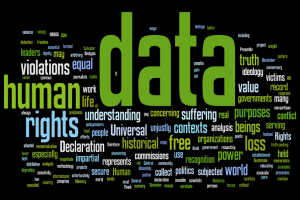A Universal Declaration of a Few Data Rights
 Today we celebrate the 65th anniversary of the Universal Declaration of Human Rights, which was adopted by the UN General Assembly on 10 December 1948. At HRDAG, we are non-partisan: we do not favor any party or government in conflicts. But we are not neutral: we are always in favor of human rights. We believe in the power and value of data; as we see it, data distills human actions and existence, all of which have power and value. With this in mind, we propose these seven articles that comprise our declaration of a few data rights (click through the links for some examples).
Today we celebrate the 65th anniversary of the Universal Declaration of Human Rights, which was adopted by the UN General Assembly on 10 December 1948. At HRDAG, we are non-partisan: we do not favor any party or government in conflicts. But we are not neutral: we are always in favor of human rights. We believe in the power and value of data; as we see it, data distills human actions and existence, all of which have power and value. With this in mind, we propose these seven articles that comprise our declaration of a few data rights (click through the links for some examples).
Preamble
Whereas data represents the suffering of human beings,
Whereas data, properly analyzed, is humanity’s best mechanism for understanding the scope and pattern of mass violence,
Whereas such understanding is essential for both world leaders and citizens when moral and legal judgments are necessary or imminent,
Whereas historical memory is critical to processes of vindication, memorialization, and recognition of victims, their families, and their suffering,
Now, therefore, the Human Rights Data Analysis Group proclaims this Declaration of a Few Data Rights as a common standard of achievement for all governments, truth commissions, journalists, scientists and analysts, with the goal of uncovering truths, establishing historical records, and educating peoples of the world in the most impartial manner possible, to secure the effective recognition of the power and value of data, so that the human beings represented by data may enjoy justice and freedom.Article 1
All data is free and equal in dignity, including data concerning suffering and loss of life within the contexts of conflicts and human rights violations. All points of data are equal to the analyst; every enumerated loss is equal in weight and import, regardless of country of origin or the persons or agencies that have recorded it.Article 2
All data shall be free and secure. Data should be free of partiality and unyoked to intention, ideology, or politics. Likewise, data should be secured against and kept private from government or other forces that wish to use it for the purposes of repression, ideology, or politics.Article 3
No data shall be held in servitude—not for the purposes of abetting perpetrators’ violence, nor for the purposes of serving prosecutors unjustly.Article 4
No data shall be subjected to cruel or degrading treatment, such as inappropriate methodology or inadequate analysis. Data deserves the full benefit of scientific analysis.Article 5
Data must be recognized before the law. Rigorously executed data analysis, especially about loss of life in the contexts of conflict and human rights violations, belongs in the hands and minds of policymakers and in courtrooms.Article 6
No data shall be subjected to arbitrary arrest, detention, or exile. Governments shall not suppress data about human rights violations, and when governments are found to have suppressed such data, they shall be held accountable for their violation.Article 7
Data, especially data concerning loss of life in the contexts of conflict and human rights violations, shall be free to peacefully assemble and associate. No data shall be withheld from truth-seeking organizations if that data can contribute to a further establishment of an accurate historical record.
Champions and defenders of human rights around the world have pioneered the use of large-scale data; by doing so, they pay tribute to the people whom the data represents. Despite all this commendable work, sadly, there is a great magnitude of work left to be done by the international human rights community. We look forward to working with partners around the world to collect, organize, and analyze human rights data, and we offer our deepest thanks to the activists who tirelessly document mass violence and advocate for a better world.
[Creative Commons BY-NC-SA, including image]